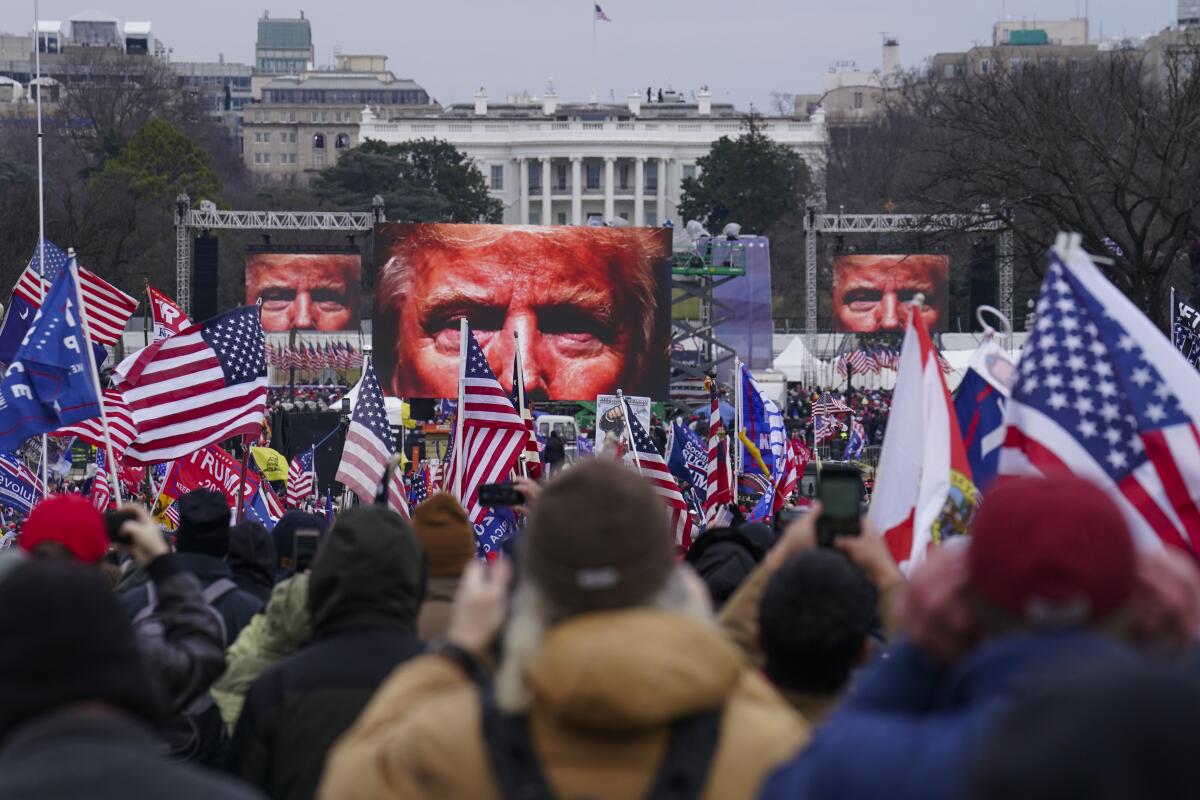Trump’s presidential bid hangs in the balance at the Supreme Court. Here’s what to know

- Share via
WASHINGTON — Whether former President Trump is allowed to seek reelection is now in the hands of the U.S. Supreme Court.
The justices are hearing arguments Thursday in Trump’s appeal of a Colorado Supreme Court ruling that he is not eligible to run for president because he violated a provision in the 14th Amendment that prevents those who “engaged in insurrection” from holding office.
Many legal observers expect that the nation’s highest court will reverse theColorado ruling rather than remove the leading contender for the Republican presidential nomination from the ballot. But it’s always tricky to try to predict a Supreme Court ruling, and the case against Trump has already broken new legal ground.
These are some of the main issues involved in the 14th Amendment cases:
What might keep him off the ballot?
Section 3, which reads: “No Person shall be a Senator or Representative in Congress, or elector of President and Vice President, or hold any office, civil or military, under the United States, or under any State, who, having previously taken an oath, as a member of Congress, or as an officer of the United States, or as a member of any State legislature, or as an executive or judicial officer of any State, to support the Constitution of the United States, shall have engaged in insurrection or rebellion against the same, or given aid or comfort to the enemies thereof. But Congress may by a vote of two thirds of each House, remove such disability.”
A look at some of the Trump legal team’s arguments in response:
Trump’s opponents have succeeded in getting to the U.S. Supreme Court with their argument the 14th Amendment disqualifies him from the ballot. But they face hurdles.
Trump’s defense
His lawyers say this part of the Constitution was not meant to apply to presidents. It specifically mentions electors, senators and representatives, but not the president, they argue.
It also says it applies to those who swear to “support” the United States. The presidential oath doesn’t use that word. Instead, the Constitution requires presidents to swear they will “preserve, protect and defend” the Constitution.
And finally, Section 3 talks about any other “officer” of the United States, but Trump’s lawyers argue that language is meant to apply to presidential appointees, not the president.
Those arguments were enough to convince the Colorado district court judge who initially heard the case. She found Trump engaged in insurrection, but agreed it wasn’t clear that Section 3 applied to presidents. The state’s high court reversed the latter part of her ruling and banned Trump from Colorado’s ballot.
The court’s majority wrote that Trump “asks us to hold that Section 3 disqualifies every oath-breaking insurrectionist except the most powerful one and that it bars oath-breakers from virtually every office, both state and federal, except the highest one in the land.”
Other Trump arguments
His lawyers contend that the question of who is covered by a rarely used, once-obscure clause should be decided by Congress, not by unelected judges.
The attorneys also contend that the Jan. 6, 2021, attack on the U.S. Capitol wasn’t an insurrection, as it wasn’t widespread and didn’t involve a large number of firearms or certain other markers of sedition. And they say Trump didn’t engage in anything that day other than exercising his free speech rights.
Others who are skeptical of applying Section 3 to Trump have made an argument that the dissenting Colorado Supreme Court justices found persuasive: that the way the court went about finding that Trump had violated Section 3 violated his due-process rights. They contend that he was entitled to a structured legal process rather than having a state court determine whether a provision in the Constitution applied to him.
That gets at the unprecedented nature of the case. Section 3 has rarely been used since an 1872 congressional amnesty excluded most former Confederates from it. The U.S. Supreme Court has never heard such a case.
Arguments about legal precedents date back to a lone 1869 opinion from Chief Justice Salmon Chase, who was hearing an appeal as a circuit judge rather than for the high court.
So Trump’s case is historic and is expected to create new law.
Isn’t this just a partisan case?
Not really.
It’s true that a lot of Democrats are rooting for Trump to get kicked off the ballot and that a lot of Republicans are angry about the possibility. The case was filed by Citizens for Responsibility and Ethics in Washington, a left-leaning group.
But some of the most vocal proponents of removing Trump from the ballot are conservative legal scholars who believe in strictly following the words of the Constitution. There’s no way around the insurrection disqualification for Trump, they say, adding that it’s there in plain text and was intended by the authors.
Also, the plaintiffs who brought the Colorado case against Trump are all GOP or unaffiliated voters.
All seven of the justices on Colorado’s Supreme Court were appointed by Democrats. But they split 4 to 3 on the decision, suggesting that positions on the issue don’t fall neatly along partisan lines.
California Secretary of State Shirley Weber said state law does not allow her to remove Donald Trump from the March 5 ballot and leaves the decision up to the courts.
The majority quoted a ruling from U.S. Supreme Court Justice Neil M. Gorsuch, one of Trump’s conservative nominees, from when Gorsuch was a federal judge in Colorado. He ruled then that the state properly kept a naturalized citizen born in Guyana off the presidential ballot because the candidate didn’t meet the constitutional qualifications.
In Maine, the Democratic secretary of state has also removed Trump from the state ballot. In Illinois, a retired judge serving as a state elections board hearing officer essentially joined the notable Republicans siding with those trying to disqualify the former president, suggesting that the state keep Trump on its ballot only because he believed the issue should be settled by the courts — which he said would probably disqualify the ex-president under Section 3.
On the U.S. Supreme Court, six of nine justices were nominated by Republican presidents, including three by Trump. But it’s hard to predict how individual justices will rule, partly because this is new legal ground.
What could the court do?
Several outcomes are possible, but they generally fall into three areas.
The first is that the court could uphold Colorado’s ruling. That would signify a loss for Trump and for his lawyers’ arguments.
The second is that the court could rule that Trump can’t be disqualified under Section 3. That would end the case to keep him off Colorado’s ballot, as well as dozens of similar challenges in other states.
The third possibility unnerves a lot of legal experts: The justices could effectively punt and not make a final decision on whether Trump is qualified to run for president. If he wins in November, that could kick the question down the road to Jan. 6, 2025, when Congress must decide whether to certify his victory.
The justices punting the decision would also keep alive many other cases on Trump’s eligibility across the country that are on hold as state courts wait to see what the high court will do. Illinois, Minnesota and Oregon are among the states where cases could be rekindled if the justices don’t squelch the Colorado ruling.
Punting could also add further pressure to challenge Trump’s eligibility in other Democratic strongholds such as California and New York, where pushes to invalidate his candidacy have been relatively muted.
And while the Trump campaign says more than 60 Section 3 cases have been filed nationally, most have been by low-profile people or groups and have been dismissed for procedural reasons. Uncertainty from the nation’s highest court could encourage a new wave of cases in those states, too.
The lack of a clear ruling also could create counter-challenges. Republicans have warned that Section 3 could also be used against Democrats.
Some in the GOP have already proposed filing Section 3 challenges against President Biden under the theory that his failure to stem the flow of migrantsat the U.S.-Mexico border amounts to providing “aid and comfort” to U.S. enemies. Vice President Kamala Harris also could be targeted under the theory that her raising bail money for people arrested in the protests after George Floyd’s 2020 murder by Minneapolis police amounts to “engaging in insurrection.”
Unless the high court shuts this down, these Republicans say, Trump’s case might only be the start.
More to Read
Get the L.A. Times Politics newsletter
Deeply reported insights into legislation, politics and policy from Sacramento, Washington and beyond. In your inbox twice per week.
You may occasionally receive promotional content from the Los Angeles Times.











